
Service Civil International
Encyclopedia
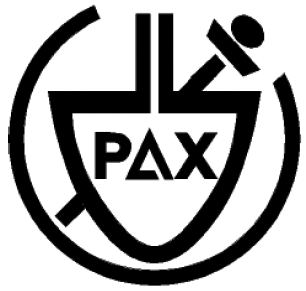
International
----International mostly means something that involves more than one country. The term international as a word means involvement of, interaction between or encompassing more than one nation, or generally beyond national boundaries...
non-governmental
Non-governmental organization
A non-governmental organization is a legally constituted organization created by natural or legal persons that operates independently from any government. The term originated from the United Nations , and is normally used to refer to organizations that do not form part of the government and are...
voluntary
Volunteering
Volunteering is generally considered an altruistic activity, intended to promote good or improve human quality of life, but people also volunteer for their own skill development, to meet others, to make contacts for possible employment, to have fun, and a variety of other reasons that could be...
service organisation and peace
Peace
Peace is a state of harmony characterized by the lack of violent conflict. Commonly understood as the absence of hostility, peace also suggests the existence of healthy or newly healed interpersonal or international relationships, prosperity in matters of social or economic welfare, the...
movement
Social movement
Social movements are a type of group action. They are large informal groupings of individuals or organizations focused on specific political or social issues, in other words, on carrying out, resisting or undoing a social change....
with 43 branches and groups worldwide. The organisation was founded in 1920 by Swiss Engineer Pierre Ceresole
Pierre Cérésole
Pierre Cérésole was a Swiss engineer, known primarily as the founder of the Service Civil International , or International Voluntary Service for Peace , in 1920, an organisation that helped in reconstruction after the First World War with the goal of achieving an atmosphere of brotherhood...
.
Aims
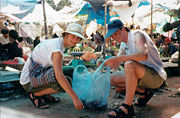
- VolunteeringVolunteeringVolunteering is generally considered an altruistic activity, intended to promote good or improve human quality of life, but people also volunteer for their own skill development, to meet others, to make contacts for possible employment, to have fun, and a variety of other reasons that could be...
- in the sense of acting out of self-initiative, without seeking material reward and for the benefit of civil societyCivil societyCivil society is composed of the totality of many voluntary social relationships, civic and social organizations, and institutions that form the basis of a functioning society, as distinct from the force-backed structures of a state , the commercial institutions of the market, and private criminal...
, as a method and a statement for social change, whilst never competing with paid labour nor seeking to contribute to strike-breaking - Non-violence – as a principle and a method
- Human RightsHuman rightsHuman rights are "commonly understood as inalienable fundamental rights to which a person is inherently entitled simply because she or he is a human being." Human rights are thus conceived as universal and egalitarian . These rights may exist as natural rights or as legal rights, in both national...
– respect for individuals as stated in the Universal Declaration of Human RightsUniversal Declaration of Human RightsThe Universal Declaration of Human Rights is a declaration adopted by the United Nations General Assembly . The Declaration arose directly from the experience of the Second World War and represents the first global expression of rights to which all human beings are inherently entitled... - Solidarity (sociology)Solidarity (sociology)Solidarity is the integration, and degree and type of integration, shown by a society or group with people and their neighbors. It refers to the ties in a society - social relations - that bind people to one another. The term is generally employed in sociology and the other social sciences.What...
– international solidarity for a more just world and solidarity between human beings at all levels - Respect for the EnvironmentNatural environmentThe natural environment encompasses all living and non-living things occurring naturally on Earth or some region thereof. It is an environment that encompasses the interaction of all living species....
– and the ecosystemEcosystemAn ecosystem is a biological environment consisting of all the organisms living in a particular area, as well as all the nonliving , physical components of the environment with which the organisms interact, such as air, soil, water and sunlight....
of which we are a part and upon which we are dependent - Inclusion - to be open and inclusive to all individuals who share the aims and objectives of the movement, without regard to gender, race, colour, religion, nationality, social status or political views and any other possible grounds for discrimination
- EmpowermentEmpowermentEmpowerment refers to increasing the spiritual, political, social, racial, educational, gender or economic strength of individuals and communities...
– empowering people to understand and act to transform the social, cultural and economic structures that affect their lives at all levels - Co-operation – with local communities as well as other local, national and international actors to strengthen the positive potential within civil society as a whole.
SCI believes that all people are capable of living together with mutual respect and without recourse to any form of violence
Violence
Violence is the use of physical force to apply a state to others contrary to their wishes. violence, while often a stand-alone issue, is often the culmination of other kinds of conflict, e.g...
to solve conflicts
Group conflict
Group conflict, or hostilities between different groups, is a pervasive feature common to all levels of social organization .. Although group conflict is one of the most complex phenomena studied by social scientists, the history of the human race evidences a series of group-level conflicts that...
. It organises international volunteer projects all over the world because it believes that peace can only be built if people with different backgrounds and cultures learn to co-operate and work together.
History
SCI was born out of a passionate search for peace, immediately after World War I. Taking part in the first International Conference of the Fellowship of ReconciliationInternational Fellowship of Reconciliation
The International Fellowship of Reconciliation is an international faith-based nonviolent movement created shortly after the First World War, in 1919, to draw together national Fellowships of Reconciliation that had been founded during the war....
in 1920 in Bilthoven, Pierre Ceresole
Pierre Cérésole
Pierre Cérésole was a Swiss engineer, known primarily as the founder of the Service Civil International , or International Voluntary Service for Peace , in 1920, an organisation that helped in reconstruction after the First World War with the goal of achieving an atmosphere of brotherhood...
, a Swiss radical pacifist initiated a peace project with volunteers from different countries in France.
From reconciliation to emergency aid (1920)
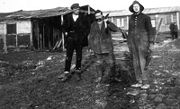
Battle of Verdun
The Battle of Verdun was one of the major battles during the First World War on the Western Front. It was fought between the German and French armies, from 21 February – 18 December 1916, on hilly terrain north of the city of Verdun-sur-Meuse in north-eastern France...
of Verdun
Verdun
Verdun is a city in the Meuse department in Lorraine in north-eastern France. It is a sub-prefecture of the department.Verdun is the biggest city in Meuse, although the capital of the department is the slightly smaller city of Bar-le-Duc.- History :...
(France) in 1920 in order to reconstruct the war damaged village Esnes-en-Argonne
Esnes-en-Argonne
Esnes-en-Argonne is a commune in the Meuse department in Lorraine in north-eastern France.-See also:*Communes of the Meuse department...
and being a symbol of reconciliation between France and Germany. Among the small group of international volunteers were also three German volunteers. They build up temporary homes for the villagers and cleared the farm land.
In 1924 Ceresole organised a second international workcamp in Les Ormonts
Ormont-Dessus
Ormont-Dessus is a municipality of the canton of Vaud in Switzerland, located in the district of Aigle.-History:Ormont-Dessus is first mentioned in 1200 as Ormont. The German name of Ormund is no longer used.-Geography:...
(Switzerland), which helped to clear rubble after an avalanche. This service was promoted as a model service for conscientious objectors, in order to support a political campaign to introduce an alternative service
Alternative service
Alternative service is a form of national service performed in lieu of conscription for various reasons, such as conscientious objection, inadequate health, or political reasons. See "labour battalion" for examples of the latter case...
. In the following years more relief services were organized. The largest has been in 1928 in Liechtenstein
Liechtenstein
The Principality of Liechtenstein is a doubly landlocked alpine country in Central Europe, bordered by Switzerland to the west and south and by Austria to the east. Its area is just over , and it has an estimated population of 35,000. Its capital is Vaduz. The biggest town is Schaan...
with more than 700 volunteers from 28 countries, which cleared the Rhine valley plain after a heavy flood in 1927.
Evolvement in social commitment (1931)
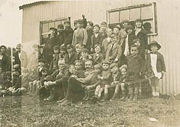
- Community development: During the economic crisis of the coal mining industry in Wales, a workcamp was organised to restore self-confidence in distressed mining town of BrynmawrBrynmawrBrynmawr is a market town in Blaenau Gwent, south Wales. The town, sometimes cited as the highest town in Wales, is situated at 1,250 to 1,500 feet above sea level and nestled at the head of the South Wales Valleys...
(Wales, Great Britain). Volunteers and unemployed men build a swimming pool and layout a public park. - Developmental aidDevelopment aidDevelopment aid or development cooperation is aid given by governments and other agencies to support the economic, environmental, social and political development of developing countries.It is distinguished...
: In 1931 Ceresole got acquainted with Gandhi, which invited him to bring SCI to India. In 1934 he travelled to India in order to organize workcamps for a region affected by the earthquake in BiharBiharBihar is a state in eastern India. It is the 12th largest state in terms of geographical size at and 3rd largest by population. Almost 58% of Biharis are below the age of 25, which is the highest proportion in India....
. This project was repeated in 1935 and 1936. Further development aid projects followed after World War II. - Humanitarian help: In 1937 SCI was mandated by a group of aid organizations, in order to give humanitarian help for refugee children during the Spanish Civil war (1936-1939)Spanish Civil WarThe Spanish Civil WarAlso known as The Crusade among Nationalists, the Fourth Carlist War among Carlists, and The Rebellion or Uprising among Republicans. was a major conflict fought in Spain from 17 July 1936 to 1 April 1939...
. Evacuation services, food and clothing distribution were carried out in the part of the Spanish Republic. Twenty years later humanitarian help was given to war orphans in Tunisia during the Algerian independence war (1958-1962). Besides those two projects, humanitarian help never got any further importance in SCI.
International organisation (1948)
Since 1920 SCI organised workcamps and activities with no formal structure in France, Switzerland, Great Britain, India, and other countries. As the idea workcamps expanded to other countries after World War II an international association of SCI branches with an international secretariat in Paris was founded. The volunteer exchange and workcamp organisation were improved (e.g. set up of a volunteer insurance). The number of workcamps and volunteers increased tremendously:- 1947: 46 workcamps in 9 countries
- 1968: 298 workcamps in 24 countries.
The number branches increased similar. In the 60s regional coordination structures for Africa, Asia and Europa were set up.
North-South and Development Aid (1950)
In 1950 SCI was invited by the recent independent India in order to carry out construction of houses for refugees in FaridabadFaridabad
Faridabad is a city in the south-east of Haryana state in northern India, in Faridabad district. It lies at 28º 25' 16" N Latitude and 77º 18' 28" E Longitude. The district shares its boundaries with the National Capital and Union Territory of Delhi to its north, Gurgaon district to the west and...
(India) and. A small group of international volunteer was able to recruit many local volunteers. The conflict between India and Pakistan inspired them to organise workcamps in Pakistan from 1951 on. As consequence several local branches and groups of SCI were founded in Asia.
Confronted by the immense poverty in disadvantaged regions in Europe, Asia and Africa, SCI started to set up development aid program
Development aid
Development aid or development cooperation is aid given by governments and other agencies to support the economic, environmental, social and political development of developing countries.It is distinguished...
and recruiting qualified volunteers. The largest development programme was in the province of Tlemcen
Tlemcen
Tlemcen is a town in Northwestern Algeria, and the capital of the province of the same name. It is located inland in the center of a region known for its olive plantations and vineyards...
, West Algeria
Algeria
Algeria , officially the People's Democratic Republic of Algeria , also formally referred to as the Democratic and Popular Republic of Algeria, is a country in the Maghreb region of Northwest Africa with Algiers as its capital.In terms of land area, it is the largest country in Africa and the Arab...
, after the independence war
Algerian War of Independence
The Algerian War was a conflict between France and Algerian independence movements from 1954 to 1962, which led to Algeria's gaining its independence from France...
(1954-1962). From 1962 till 1968 SCI rebuilt the village Beni Hamou, set up a medical service and community development like primary teaching for the district of Sebdou
Sebdou District
Sebdou District is a district of Tlemcen Province in north-western Algeria....
.
East-West (1955)
Despite the Cold WarCold War
The Cold War was the continuing state from roughly 1946 to 1991 of political conflict, military tension, proxy wars, and economic competition between the Communist World—primarily the Soviet Union and its satellite states and allies—and the powers of the Western world, primarily the United States...
SCI looked for an exchange Eastern bloc. As non-communist organisation, SCI volunteers took part in a workcamp during 5th World Youth Festival in Warsaw
Warsaw
Warsaw is the capital and largest city of Poland. It is located on the Vistula River, roughly from the Baltic Sea and from the Carpathian Mountains. Its population in 2010 was estimated at 1,716,855 residents with a greater metropolitan area of 2,631,902 residents, making Warsaw the 10th most...
(Poland) in 1955. From then on workcamps were co-organised with socialist volunteer organisation in Poland (1955), GDR (1956), USSR (1958), Hungary (1964), Czechoslovakia (1964), and Bulgaria (1981). This contatcts were intensified in the 70s. 1972 SCI set up East West commission in order to facilitate volunteer exchange and to improve co-operation with partner organisations in socialist countries.
With the political shift in Eastern Europe new SCI initiatives started since 1990.
Reorientation (1969)
In a row of seminars, workshops and meetings from 1969 on, the political implication of SCI in society were reviewed. As consequence SCI abandon the developmental aidDevelopment aid
Development aid or development cooperation is aid given by governments and other agencies to support the economic, environmental, social and political development of developing countries.It is distinguished...
approach as one of the main purpose of workcamps. The social and political awareness rising for and through international volunteers got focus in most activities of SCI. In particular the North-South
North-South divide
The north–south divide is a socio-economic and political division that exists between the wealthy developed countries, known collectively as "the north", and the poorer developing countries , or "the south." Although most nations comprising the "North" are in fact located in the Northern Hemisphere ,...
reorientate to the concept of development education and solidarity. E.g. several international campaigns (1985-1992) for the independence of Namibia were organise, which was followed by an international refugee campaign (1994-1997).
The reorientation lead to further standardisation in international volunteer exchange. In the late 70s a decentralised volunteer placement system for workcamps was introduced, while the North-South and East-West exchange were centralised by European and International Co-ordination of SCI. The latter was decentralised in the mid 90s.
International working groups (1997)
With the reorientation in the 70s, SCI converted its structure with international and regional secretariats to and international coordination with working groups with focus on a particular region or interest area. In 1997 major constitutional change introduced a status for working groups, which are approved now every year. Regional working groups exists for Africa, Asia and Latin America (Aba Yala) and South Eastern Europe (SAVA). The other working groups focused on the following topics:- Immigration & refugee (since 1970) e.g. European Centre for Immigration
- East-West exchange (since 1972) e.g. Group of Action together in Europe (GATE)
- Gender issue (since 1983) e.g. WIN
- Conscientious Objection (1984-1990)
- Youth and Unemployment (since 1985) YUWG
- North-South Exchange (since 1987): e.g. SEED
- Long Term Volunteering (since 1989): e.g. LTRC
- Environmental issues (since 1998)
- Human Rights (since 1998)
List of SCI Branches & Groups
SCI divides between full member with branches-status and associated members with group-status. The international committee of SCI decides about the status based on the national constitution, organisation and infrastructure of its members. The national branches can have their own names, when they state "branch of SCI" in their documents. The following tables gives an overview on all branches and groups of SCI. The beginning of activities often refers to the first workcamp organised by or in co-operation with SCI.| Continent | Country | Organisation | Begin of activities | Branch since | Remark |
| Africa | Algeria | SCI Algeria | 1948 | 1952 | Dissolved 1954 |
| Mauritius | SVI Mauritius | 1960 | 1981 | ||
| Nigeria | VWAN Nigeria | 1963 | (2009) | SCI Group | |
| Asia | Bangladesh | SCI Bangladesh | 1962 | 1972 | |
| India | SCI India | 1934 | 1956 | ||
| Japan | SCI Japan | 1958 | 1964 | ||
| Malaysia | SCI Malaysia | 1964 | 1992 | ||
| Nepal | SCI Nepal | 1961 | 1994 | ||
| Pakistan | SCI Pakistan | 1951 | 1997 | ||
| South Korea | SCI South Korea | 1965 | ? | ||
| Sri Lanka | SCI Sri Lanka | 1960 | 1994 | ||
| Australia | Australia | IVP Australia | 1988 | (2002) | SCI Group |
| Europe | Albania | PVN Albania | 2005 | (2009) | SCI Group |
| Austria | SCI Austria | 1947 | 1949 | ||
| Belarus | New Group Belarus | 1992 | (2000) | SCI Group | |
| Belgium | SCI Belgium | 1947 | 1948 | ||
| VIA Belgium | 1946 | 1977 | |||
| Bulgaria | CVS Bulgaria | 1974 | 2004 | ||
| Croatia | VCZ Croatia | 1964 | 2007 | ||
| Denmark | 1948 | 1954 | Dissolved 1980 | ||
| Finland | KVT Finland | 1947 | 1981 | ||
| France | SCI France | 1920 | 1936 | ||
| Germany | SCI Germany | 1946 | 1948 | ||
| Great Britain | IVS Great Britain | 1931 | 1948 | ||
| Greece | SCI Hellas | 1944 | 1992 | ||
| Hungary | Utilapu Hungary | 1966 | 2002 | ||
| Ireland | VSI Ireland | 1965 | 1973 | ||
| Italy | SCI Italy | 1945 | 1948 | ||
| Moldova | AVI Moldova | 1962 | (2004) | SCI Group | |
| Netherlands | VIA Netherlands | 1941 | 1948 | ||
| Northern Ireland | IVS Northern Ireland | 1972 | 1987 | Dissolved around 2007 | |
| Norway | ID Norway | 1939 | 1948 | ||
| Poland | OWA Poland | 1947 | 1999 | ||
| Romania | SCI Romania | 1991 | 1998 | ||
| Serbia | VCV Serbia | 2004 | 2008 | ||
| Slovenia | Voluntariat SCI Slovenia | 1963 | 1998 | ||
| Spain | SCI Catalonia | 1982 | 1989 | ||
| SCI Madrid | 1937 | 2001 | |||
| Sweden | IAL Sweden | 1936 | 1969 | ||
| Switzerland | SCI Switzerland | 1924 | 1948 | ||
| Ukraine | SVIT Ukraine | 2005 | 2009 | ||
| Latin America | Brazil | SVI Brazil | 2008 | (2009) | SCI Group |
| Mexico | SCM Mexico | ? | (2007) | SCI Group | |
| North America | United States of America | SCI-IVS USA | 1956 | 1963? | |
Networking
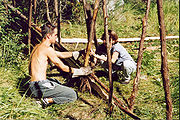
Council of Europe
The Council of Europe is an international organisation promoting co-operation between all countries of Europe in the areas of legal standards, human rights, democratic development, the rule of law and cultural co-operation...
, operational relations with UNESCO
UNESCO
The United Nations Educational, Scientific and Cultural Organization is a specialized agency of the United Nations...
and is a member of:
- CCIVSCCIVSCo-ordinating Committee for International Voluntary Service or CCIVS began in its modern form in 1920. The idea was the result of a meeting of a group of Europeans following the First World War...
(Coordinating Committee of International Voluntary Service Organisations) - YFJ (Youth Forum Jeunesse)
- UNITED for Intercultural ActionUNITED for Intercultural ActionUNITED for Intercultural Action is the biggest European network against nationalism, racism, fascism and in support of migrants and refugees, in which over 560 organisations from 46 European countries cooperate...
- a European network against nationalismNationalismNationalism is a political ideology that involves a strong identification of a group of individuals with a political entity defined in national terms, i.e. a nation. In the 'modernist' image of the nation, it is nationalism that creates national identity. There are various definitions for what...
, racismRacismRacism is the belief that inherent different traits in human racial groups justify discrimination. In the modern English language, the term "racism" is used predominantly as a pejorative epithet. It is applied especially to the practice or advocacy of racial discrimination of a pernicious nature...
, fascismFascismFascism is a radical authoritarian nationalist political ideology. Fascists seek to rejuvenate their nation based on commitment to the national community as an organic entity, in which individuals are bound together in national identity by suprapersonal connections of ancestry, culture, and blood...
In 1987, SCI was awarded the title of Messenger of Peace given by the United Nations
United Nations
The United Nations is an international organization whose stated aims are facilitating cooperation in international law, international security, economic development, social progress, human rights, and achievement of world peace...
, in acknowledgement of its efforts to promote peace and understanding.
Full members status is held to the European Youth Forum
European Youth Forum
The European Youth Forum is the platform of the national youth councils and international non-governmental youth organisations in Europe...
(YFJ) which operates within the Council of Europe
Council of Europe
The Council of Europe is an international organisation promoting co-operation between all countries of Europe in the areas of legal standards, human rights, democratic development, the rule of law and cultural co-operation...
and European Union
European Union
The European Union is an economic and political union of 27 independent member states which are located primarily in Europe. The EU traces its origins from the European Coal and Steel Community and the European Economic Community , formed by six countries in 1958...
areas and works closely with both these bodies.

